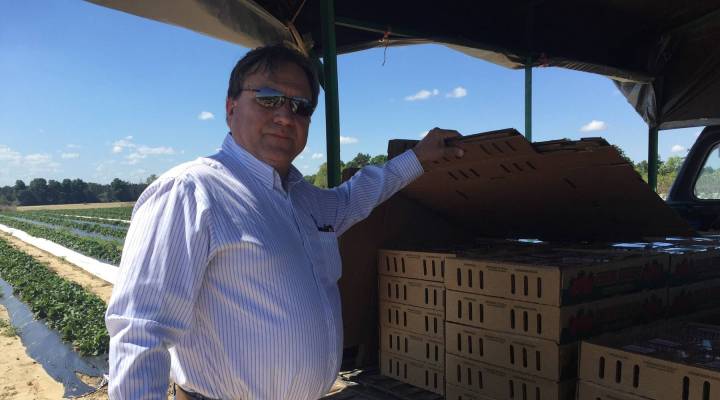
Amid Trump’s immigration crackdown, farmers look for reform
Amid Trump’s immigration crackdown, farmers look for reform

In Irwin County, Georgia, Gary Paulk walks through a field of strawberries as workers load a truck that’s playing music. He greets his employees, some of whom he’s known for decades.
Paulk is a fifth generation farmer who specializes in muscadines at Paulk Vineyards. Strawberries are a new crop for him this year. As for finding labor this year, he said he’s been fine, but there was also a late freeze that killed some of his crops. Back in 2011, when Georgia passed an immigration enforcement bill, Paulk said many workers left or bypassed coming to the state.
“It just ended up scaring everybody away,” he said. “That’s the year we probably lost $200,000 with fruit just rotting off, falling off the vines because we couldn’t pick it.”
Paulk and other farmers have been following the immigration debate in Washington as President Donald Trump has moved forward with cracking down on immigration. He said he’s concerned about how it’s caused fear in immigrant communities, where there are people or those with family members who work in agriculture.
Paulk said he’s advertised farm worker jobs — which pay about $10.65 an hour — before hiring guest workers, but said Americans generally don’t apply.
“I want to offer the safest food, sustainable, nutritional food available to my city cousins in Atlanta, but it just doesn’t happen. Somebody’s got to plant it, and they got to prune it, and they got to grow it, and it’s got to be harvested,” Paulk said.
A group of organizations representing Georgia farmers sent a letter to the state’s Congressional delegation earlier this year on immigration. They asked for legislation to allow for a way for undocumented workers to be able to come forward so they can register to work legally. The U.S. Department of Labor’s survey shows nearly half – 47 percent – of crop workers in America are unauthorized.
If farmers can’t find American workers, some have asked why farmers haven’t raised wages.
“There is some hypothetical wage at which Americans will take seasonal, harvesting jobs in U.S. agriculture,” said Philip Martin, a professor of agricultural and resource economics at the University of California Davis.
Martin said before that wage is reached, other things would likely happen first.
“We will never see a lot of Americans out in the fields because the technology is available to substitute for workers when wages rise, and if we don’t have technology, there will be increased imports,” Martin said.
Meanwhile, Paulk and other farmers say the temporary guest worker program, called H-2A, hasn’t been all that easy. It’s estimated that about 10 percent of agriculture jobs are filled by the H-2A workers.
Each year, farmer Bill Brim of Lewis Taylor Farms in Tifton, Georgia, hires about 500 people through the program. Brim has an operation of more than 5,000 acres, where he grows produce.
“H-2A is a good program, but it’s just really cumbersome. It’s hard to deal with,” Brim said. “You’ve got to have so many people working on it to make sure you’re doing the right thing, to try to get focused on it.”
Brim said there’s a lot of paperwork, delays and regulation. Growers have to do things like provide free housing for workers. He said he’d like to see an overhaul of H-2A regulations, something the group of farmer organizations asked for in their letter to Georgia Congressional members.
As the Trump administration cracks down on illegal immigration, Brim said it’s imperative to streamline the H-2A process.
“If we don’t have immigration, you’ll quit eating — that’s how important it is. Because we won’t have the help here to pick it,” he said.
Legislation aimed at changing the H-2A program has failed over the years, but there are newer bills pending in Congress.
| As farmworkers grow scarce, wages are on the rise |
| Mushroom farmers dependent on immigrant labor fear worker shortage |
| NAFTA helped U.S. corn farmers, but may have boosted illegal immigration |
There’s a lot happening in the world. Through it all, Marketplace is here for you.
You rely on Marketplace to break down the world’s events and tell you how it affects you in a fact-based, approachable way. We rely on your financial support to keep making that possible.
Your donation today powers the independent journalism that you rely on. For just $5/month, you can help sustain Marketplace so we can keep reporting on the things that matter to you.


















